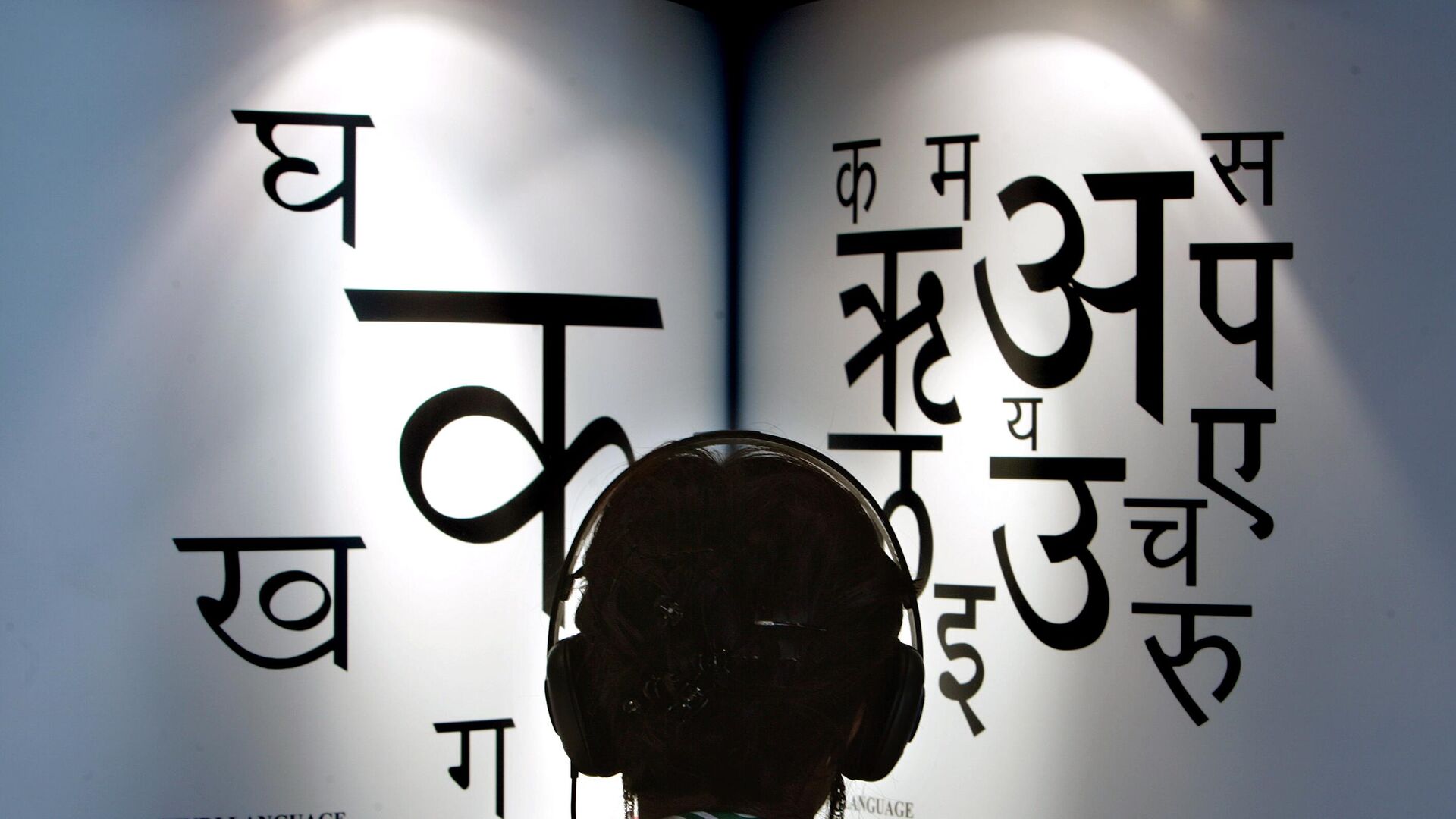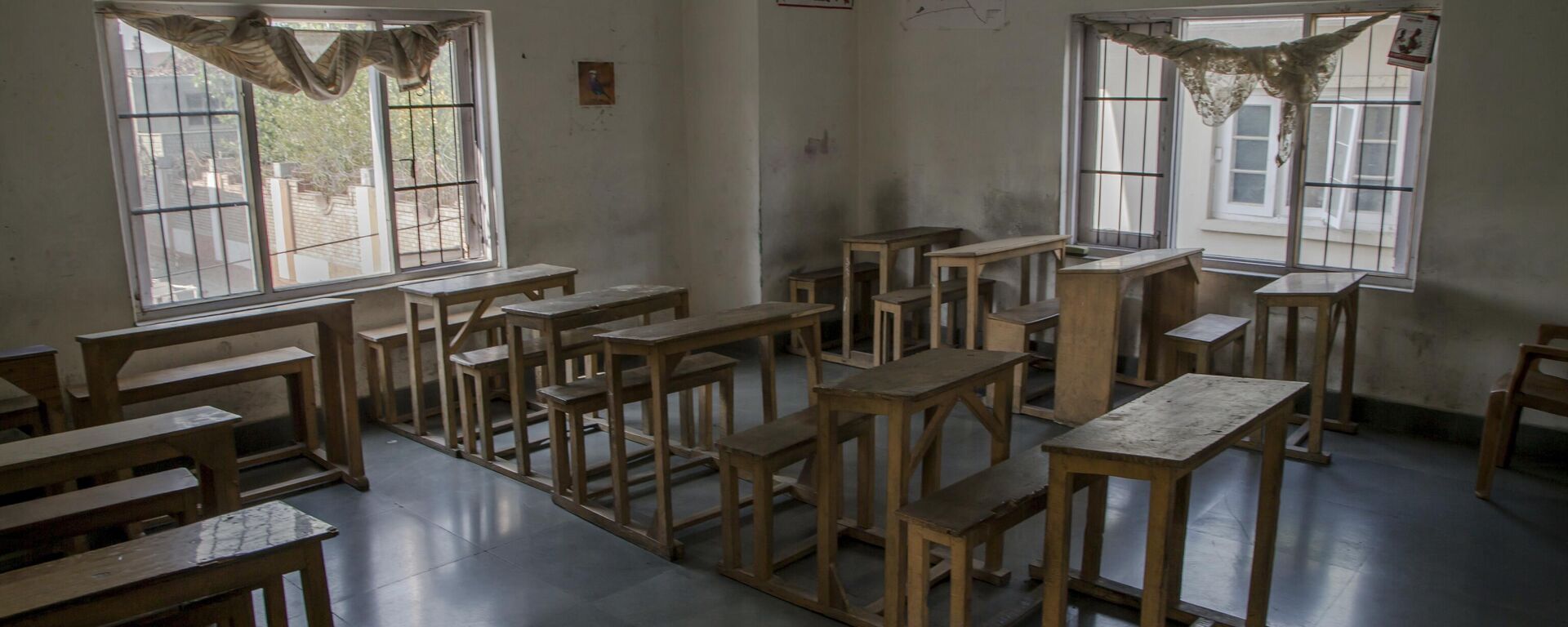https://sputniknews.in/20230914/an-edge-with-english-jims-head-speaks-on-hindi-day-4216438.html
‘An Edge With English?’: International Management School Head Speaks on Hindi Day
‘An Edge With English?’: International Management School Head Speaks on Hindi Day
Sputnik India
Citing the world language database Ethnologue, the All India Radio reported Hindi was the world's 3rd most spoken language in 2019 with 615 million speakers after English (1.132 billion) and Mandarin (1.117 billion).
2023-09-14T17:03+0530
2023-09-14T17:03+0530
2023-09-14T22:03+0530
india
new delhi
hindi diwas
bharat
akhand bharat
narendra modi
south asia
south africa
sputnik exclusives
https://cdn1.img.sputniknews.in/img/07e7/09/0e/4243800_0:0:2830:1592_1920x0_80_0_0_2357705efc47d84f8bc8d0eab9cd0fef.jpg
Despite being the third most-spoken language worldwide, Hindi seems yet to acquire its rightful place as the national language of India.On India’s Hindi Diwas (Hindi Day), Sputnik India talked to Jagannath International Management School (JIMS) Director Dr. Ravi K. Dhar, who deliberated at length on fallacies over the domestic North-South regional divide over Hindi's acceptance, the Indians' charm to use it, and need for its promotion abroad to highlight the potential Indian market.Sputnik India: How is Hindi generally looked upon as a language, especially in terms of its usage, acceptance or adoption by people of a country as diverse as India? Dr. Ravi K. Dhar: As a language, I think, it is good enough. There is nothing wrong with the language in itself. The question that actually arises is regarding its adoption by the people -- the attitude, the response, that people have towards the language. That I find is still persisting. But as far as the diaspora is concerned, what I have observed is that, like my son, he is in Switzerland. The people, who constitute the diaspora, are very sensitive about the language. And they do give as much importance to the language as much as they do give to other Anglo-Saxon or European languages.And they have come to realize this because once they are abroad, they realize that every country has its own language as a vehicle of cultural expression.Sputnik India: Is there a need to popularize and promote Hindi all around to also gravitate more and more foreign firms to the giant Indian market?Dr. Ravi: Actually you don’t have to make any institutionalized effort to promote the language.Languages get promoted only when your economics is strong enough. It is economics that determines the vehicle of cultural expression.Similarly, in the case of South Asia, as India rises economically, as India becomes powerful economically, it will be but natural that Hindi will be [more] accepted.And it is not just the hard power but also the soft power of the country as it begins to become assertive, Hindi will automatically get promoted.Sputnik India: It’s widely highlighted many people in southern India have strong reservations about Hindi being adopted as the national language. What’s the on-the-ground reality?Dr. Ravi: What I have observed, as far as my travels in southern India go, and it's a very interesting observation that I have, that it is only a certain section of people in the south that is opposed to Hindi. And this kind of a divide is basically a divide that has been created as a result of the myth of the Aryan and Dravidian theory (suggesting north Indians are descendants of Aryans while south Indians are descendants of Dravidians) that was imposed on the intellectual horizon of this country by the British.So, there is a community I wouldn’t like to name because it becomes a type of communal divide.And interestingly enough, if I may say, it is the Muslims in the South who are champions of Hindi. When you go down south, it is the Muslims who speak Hindi very happily and cheerfully. And they connect with you. Whereas Hindus, I am afraid, it may not be politically wise and correct to say this. But this is what I have observed. Because in the Hindu community, this feeling has been given that you are a Dravidian, and so you should not speak it. And Hindi is a North Indian language, and you should not be speaking it.Whereas Hindi is not the language of a specific people. Hindi is a language which was born out of the confluence of many languages. Sputnik India: But then what's the exact root cause of such concerns? Dr. Ravi: This objection is coming because of an ideological divide, which was created by this Anglo- Saxon lobby to divide the nation.Nobody has made any attempt to bridge it. This may be at the scholarly level, at the level of linguistics, all these theories have come up which have debunked this theory.But at the level of the mass culture, at the level of the popular culture, the media has not played its role well in this.
https://sputniknews.in/20230307/british-shaped-indias-education-system-to-prepare-clerks-expert-1090888.html
india
new delhi
south asia
south africa
Sputnik India
feedback.hindi@sputniknews.com
+74956456601
MIA „Rossiya Segodnya“
2023
Sandeep Datta
https://cdn1.img.sputniknews.in/img/07e7/04/07/1468069_0:258:1800:2058_100x100_80_0_0_3909870b82375b0693e9fd27915facc3.jpg
Sandeep Datta
https://cdn1.img.sputniknews.in/img/07e7/04/07/1468069_0:258:1800:2058_100x100_80_0_0_3909870b82375b0693e9fd27915facc3.jpg
News
en_IN
Sputnik India
feedback.hindi@sputniknews.com
+74956456601
MIA „Rossiya Segodnya“
Sputnik India
feedback.hindi@sputniknews.com
+74956456601
MIA „Rossiya Segodnya“
Sandeep Datta
https://cdn1.img.sputniknews.in/img/07e7/04/07/1468069_0:258:1800:2058_100x100_80_0_0_3909870b82375b0693e9fd27915facc3.jpg
hindi day 2023, national hindi day, national hindi day in english, world hindi day, international hindi day, hindi day date, hindi language day, hindi language, hindi language history, hindi language population, why was hndi chosen as the national language, why is hindi chosen as our national language, why hindi is considered as national language, why was hindi chosen as the national language of india, why is hindi language important, why is hidi is our national language, was hindi ever a national language, why is hindi not the national language of india, why south indian hate hindi, why south indian speak english, why south indian hate north indian, why tamilians hate hindi, is hindi national language of india, is hindi a popular language, how to promote hindi language in office, how to promote hindi language, what people think of hindi, what indians think about hindi, who is the father of hindi language, who is the founder of hindi language, which country use hindi language, who invented hindi language in india, is hind a easy language, hindi diwas, when is hindi diwas
hindi day 2023, national hindi day, national hindi day in english, world hindi day, international hindi day, hindi day date, hindi language day, hindi language, hindi language history, hindi language population, why was hndi chosen as the national language, why is hindi chosen as our national language, why hindi is considered as national language, why was hindi chosen as the national language of india, why is hindi language important, why is hidi is our national language, was hindi ever a national language, why is hindi not the national language of india, why south indian hate hindi, why south indian speak english, why south indian hate north indian, why tamilians hate hindi, is hindi national language of india, is hindi a popular language, how to promote hindi language in office, how to promote hindi language, what people think of hindi, what indians think about hindi, who is the father of hindi language, who is the founder of hindi language, which country use hindi language, who invented hindi language in india, is hind a easy language, hindi diwas, when is hindi diwas
‘An Edge With English?’: International Management School Head Speaks on Hindi Day
17:03 14.09.2023 (Updated: 22:03 14.09.2023) Citing the world language database Ethnologue, the All India Radio reported Hindi was the world's 3rd most-spoken language in 2019 with 615 million speakers after English (1.132 billion) and Mandarin (1.117 billion).
Despite being the
third most-spoken language worldwide, Hindi seems yet to acquire its rightful place as the national language of
India.
On India’s Hindi Diwas (Hindi Day), Sputnik India talked to Jagannath International Management School (JIMS) Director Dr. Ravi K. Dhar, who deliberated at length on fallacies over the domestic North-South regional divide over Hindi's acceptance, the Indians' charm to use it, and need for its promotion abroad to highlight the potential Indian market.
Sputnik India: How is Hindi generally looked upon as a language, especially in terms of its usage, acceptance or adoption by people of a country as diverse as India?
Dr. Ravi K. Dhar: As a language, I think, it is good enough. There is nothing wrong with the language in itself. The question that actually arises is regarding its adoption by the people -- the attitude, the response, that people have towards the language.
There is a mindset that if you are speaking in English and using it, you have a certain edge over the ones communicating in Hindi. So that kind of a mindset is a hangover from the colonial past.
That I find is still persisting.
But as far as the diaspora is concerned, what I have observed is that, like my son, he is in Switzerland. The people, who constitute the diaspora, are very sensitive about the language. And they do give as much importance to the language as much as they do give to other Anglo-Saxon or European languages.
And they have come to realize this because once they are abroad, they realize that every country has its own language as a vehicle of cultural expression.
When people start speaking in English abroad, the people of those countries ask them: 'Don’t you have your own language to talk in? Why are you speaking in a language that was imposed upon you and which is an accident of your
colonial past?'.
Sputnik India: Is there a need to popularize and promote Hindi all around to also gravitate more and more foreign firms to the giant Indian market?
Dr. Ravi: Actually you don’t have to make any institutionalized effort to promote the language.
Languages get promoted only when your economics is strong enough. It is economics that determines the vehicle of cultural expression.
So, as long as English has ruled the international scene, because English was the language of commerce; international commerce. Besides, because the Anglo-Saxon community was dominating the global economy.
Similarly, in the case of South Asia, as India rises economically, as India becomes powerful economically, it will be but natural that Hindi will be [more] accepted.
And it is not just the hard power but also the soft power of the country as it begins to become assertive, Hindi will automatically get promoted.
Sputnik India: It’s widely highlighted many people in southern India have strong reservations about Hindi being adopted as the national language. What’s the on-the-ground reality?
Dr. Ravi: What I have observed, as far as my travels in southern India go, and it's a very interesting observation that I have, that it is only a certain section of people in the south that is opposed to Hindi.
And there is another equally vocal section in the south, possibly we are not spotlighting attention on those who are very very positive about the use of language. They use Hindi with great admiration and with self-choice. This is what I have observed.
And this kind of a divide is basically a divide that has been created as a result of the myth of the Aryan and Dravidian theory (suggesting north Indians are descendants of Aryans while south Indians are descendants of Dravidians) that was imposed on the intellectual horizon of this country by the British.
So, there is a community I wouldn’t like to name because it becomes a type of communal divide.
And interestingly enough, if I may say, it is the Muslims in the South who are champions of Hindi. When you go down south, it is the Muslims who speak Hindi very happily and cheerfully. And they connect with you.
Whereas Hindus, I am afraid, it may not be politically wise and correct to say this. But this is what I have observed. Because in the Hindu community, this feeling has been given that you are a Dravidian, and so you should not speak it. And Hindi is a North Indian language, and you should not be speaking it.
Whereas Hindi is not the language of a specific people. Hindi is a language which was born out of the confluence of many languages.
If you want to pin-point it... like I am a Kashmiri. But I speak Hindi. Is it my mother tongue? No, it isn’t. But I have no objection to speaking in Hindi. Similarly, an Assamese speaks it in India, Gujarati speaks or any other people even Marathi, they speak in Hindi. They don’t have any objection. Then why is this objection arising?
Sputnik India: But then what's the exact root cause of such concerns?
Dr. Ravi: This objection is coming because of an ideological divide, which was created by this Anglo- Saxon lobby to divide the nation.
Nobody has made any attempt to bridge it. This may be at the scholarly level, at the level of linguistics, all these theories have come up which have debunked this theory.
But at the level of the mass culture, at the level of the popular culture, the media has not played its role well in this.



